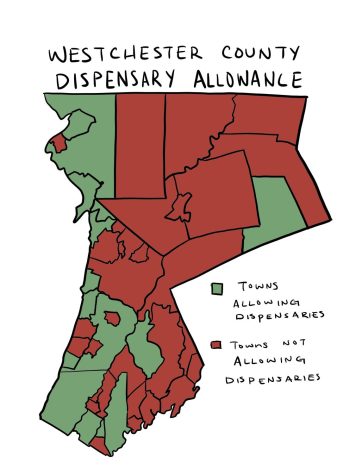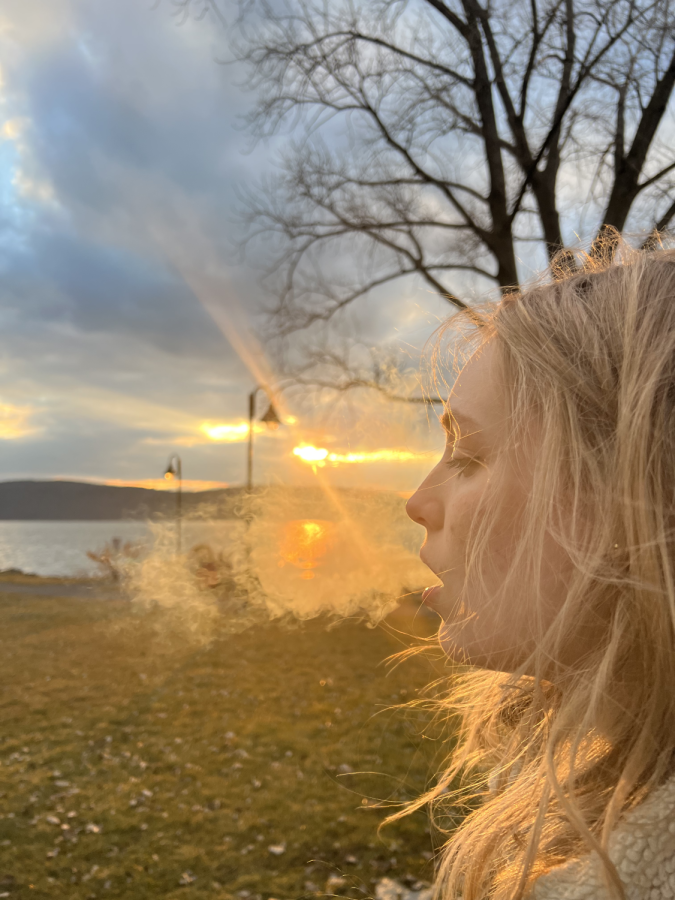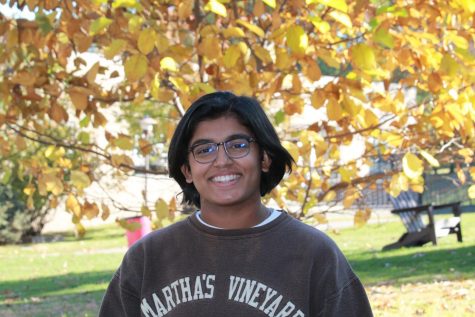Dobbs Ferry not high on marijuana legalization
A woman at the Dobbs Ferry waterfront smokes marijuana as a result of the recent legalization of recreational cannabis. While marijuana is legal and decriminalized for all adults 21 or older in New York State, Dobbs Ferry opted to not allow any dispensaries or lounges in the town.
February 22, 2022
On Nov. 23, 2021 the Dobbs Ferry Board of Trustees voted to opt-out of allowing any marijuana dispensaries or marijuana consumption sites in the village of Dobbs Ferry. The decision against dispensaries was made on a 4-3 vote, and the decision against lounges was made on a 6-1 vote.
Vincent Rosillo, the mayor of Dobbs Ferry, voted alongside the six trustees, and said that there were just too many uncertainties to vote in favor of this legislation. He said that if the town opted in they wouldn’t be able to back out, but clarified that the Town has the opportunity to opt into the new legislation in the future.
He said, “We had two public forums and people were very emotional and nervous that middle and highschoolers would see adults over 21 walking out of dispensaries and think it was normal.”
The town ended up holding a total of three public hearings in order to gauge the opinion of people in the community. The third hearing lasted three hours and involved both voting and non-voting members discussing possibilities. There seemed to be two schools of thought: those against the legislation have attached themselves to the rhetoric of marijuana being a ‘gateway drug’ to more dangerous substances, and the possibility of increased access leading to increased use, particularly with underage children. Those in favor have been citing the already-widespread use and spreading legalization of marijuana in the United States, and also noted that the money from the dispensaries would be put back into the village.
In March of 2021, the New York State Marijuana Regulation and Taxation Act (MRTA) was signed into law, officially legalizing the recreational use of marijuana for adults over the age of 21. Before that, medical marijuana use was legalized in New York State in July of 2014.
Along with the MRTA, a new Office of Cannabis Management (OCM) was created for New York State in order to “comprehensively regulate adult-use, medical and hemp cannabis.” The OCM will also be the body that issues licenses for production and selling and develops regulations for businesses participating in the new recreational industry.
Hillary Peckham ‘09 is the Chief Operations Officer for Etain Health, one of the first five legal medical marijuana dispensaries in New York State. She started the business with her mother and sister in June 2015, just a year after medical use and distribution were legalized in New York. Peckham said she thinks there are many misconceptions about marijuana use and that making sure people are purchasing from legal venues is the first step to mitigate those fears.
“Right now we’re at a point where there’s a lot of education that needs to happen about the program and the status. If you’re not purchasing from a legal entity, there’s no testing involved in the products, so you have no idea if there are contaminants or something like that,” Peckham said.
Out of the 45 cities, towns and villages in Westchester County, nine have opted in to allowing both dispensaries and consumption lounges. Out of the 1,520 municipalities in New York State, 885 have chosen to opt-out of consumption sites, and 770 have opted out of dispensaries. The decisions of the municipalities do not affect the legality of marijuana within its borders, but restrictions on sales and places of consumption are likely to significantly decrease the presence of marijuana in the area. Those that are allowing dispensaries will only be allowed to open their doors starting in 2023.
Other villages in the nearby area, like Ardsley and Irvington, have also opted out of both dispensaries and consumption lounges. Hastings-on-Hudson voted to allow a dispensary, but not a place of consumption. Sleepy Hollow didn’t have a vote, which meant they defaulted to opting in to the new laws. Towns like Dobbs Ferry still have the option to opt-in at any time, but towns that have already opted in cannot reverse the decision by opting out, given that the deadline was Dec. 31, 2021.

School counselor Lydia Whitney is a proponent of substance use prevention, having previously worked for five years at a substance abuse prevention agency directed towards youth in Tarrytown, NY. She said delaying any sort of exposure of the brain before it’s fully developed to chemicals found in drugs is most important. She said she supports Dobbs Ferry’s decision to opt out of having a dispensary in town from the perspective of prevention, not “judging whether marijuana is good or bad.”
“We’re talking about accessibility here, and there are just so many risk factors to consider for students,” Whitney said.
Senior and boarding student Sophia Tsoukalas said she supports the town’s decision to opt-out of allowing dispensaries and consumption sites. She said she sees the benefits for Masters as two fold: the decision is in alignment with Masters’ substance use policies and advances the mission of the School to protect its students, especially boarding students who wouldn’t have any other way to obtain it.
Tsoukalas said, “I think it’s going to be very helpful to the entire school community; it reinforces the School’s policies and protects students, which is really important to me.”
Masters’ Dean of Residential Life Jayde Bennett said they understand the fear that some residents may have about marijuana being readily available, leading to increased drug use in their community, but said they believe that fear is misplaced. Bennet said that they think the greater community would benefit from the increased revenue from dispensaries, which could then be channeled back into education and safety. Instead, opting out misses the opportunity to teach younger people about substance use.
“There’s a conversation we’re avoiding having about safe drug use when we restrict these establishments. The truth is, kids are going to get it if they want it, and it could be much more dangerous if left unregulated,” Bennett said. “I understand that it can bring peace of mind, but I really do think it’s a missed opportunity.”
“I think that people also need to recognize that [New York] has the largest illicit cannabis market today. If you’re not giving people legal avenues to purchase this from reputable businesses, they are purchasing it illegally,” Peckham said. “You’re not really helping anybody by keeping this illicit or by opting out of having a dispensary because people will find it in some mechanism and my preference would be that they purchase it knowing that it’s been tested, it’s safe and there’s accountability for it.”





